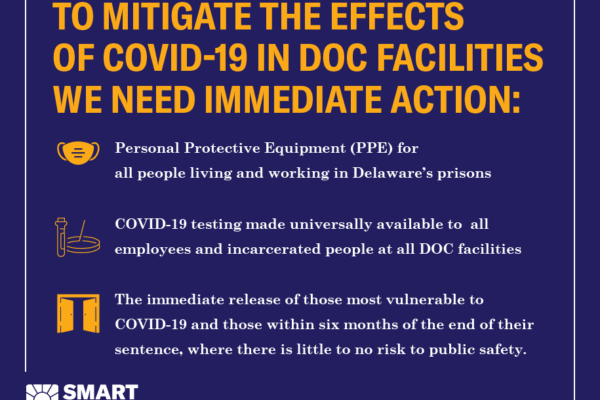As COVID-19 continues to spread across our nation with growing cases, hospitalizations, and deaths, calls for officials to implement science-based policies to protect public health have grown. Nowhere is that more important than in prisons, where incarcerated people are often medically vulnerable and unable to effectively social distance. Unfortunately, Delaware is seeing yet another outbreak of COVID-19 at one of its correctional facilities, where an astounding one in three people incarcerated at Sussex Correctional Institution have tested positive, spotlighting the failures of the state thus far.
Last week, the ACLU and Prison Policy Initiative released Failing Grades: States’ Responses to COVID-19 in Jails and Prisons. As the title suggests, no state--including Delaware--did well, with only a handful receiving a passing D- grade. Delaware was scored an abominable F, though the First State was spared an embarrassing F- mark that befell others. But the message is clear that despite all the warnings at the beginning of the pandemic, nearly every state in the Union failed to respond adequately to the crisis in our jails and prisons.
The scores for the study were based on:
- Availability of testing and Personal Protection Equipment (PPE) to incarcerated people and staff
- Reductions in state prison and jail populations
- Compassionate release of people near the end of their sentences or who were medically vulnerable
- Publication of regularly updated, and publicly available data on COVID-19 in their facilities
When COVID-19 first hit the US, public health experts warned that jails and prisons needed to take precautions to ensure that lives were not endangered. While Delaware has taken some steps to mitigate the impact of COVID-19, they have not done enough, such as releasing vulnerable people who pose little risk to public safety, making social distancing possible or distributing PPE to all incarcerated people.
In the realm of testing, the Delaware Department of Correction (DOC) has still not made universally-available testing a reality in all of our state prisons, despite our repeated calls. It is true that testing can only give a snapshot of what is happening in our state prison system, but the lack of testing continues to put people inside prisons at increased risk. The DOC itself has pointed out that many of the people that have tested positive are asymptomatic, which begs the question: how many more people have been exposed to COVID-19? We simply do not know. It is critical that we understand who is a carrier of the virus in order to keep medically vulnerable people away from those individuals--especially in a prison environment where social distancing is not always practical or enforced.
Governor Carney recently announced the expansion of testing throughout the state, where Delaweareans can drive or walk by clinics and receive test results in a matter of a few days. We agree with the Governor that access to testing is critical, but that same effort needs to be made with those who are in prisons and even more likely to contract and spread COVID-19.
The impact of Delaware’s response to COVID-19 can be felt most when we examine the deaths that have occurred in our state prisons. To date, seven people have died from COVID-19 under the responsibility of our Department of Corrections. According to The Marshall Project, that puts Delaware at the fourth highest rate of death in the nation.
Some have refuted The Marshall Project’s findings by claiming that Delaware’s prison and jail systems are unified, so it’s unfair to compare it to other state’s prison populations. But here are the facts:
- Five other states have unified jail and prison systems: Alaska, Connecticut, Hawaii, Rhode Island and Vermont.
- Alaska, Hawaii, Rhode Island and Vermont have all reported zero deaths due to COVID-19.
- Connecticut has had seven deaths--the same number as Delaware. However, Connecticut has nearly 16,000 people in its system, making it more than twice as large as Delaware’s prisons.
- All of the Delawareans who have died of COVID-19 were individuals who were serving long sentences and were not pretrial or would have otherwise been in a jail setting in another state.
The deaths in Delaware prisons most prominently bring to light the state’s failure to help those most medically vulnerable. The Delaware DOC itself has pointed out nearly all the people who have died had significant underlying medical conditions, and they ranged in age from 60 to 81 years old. While these individuals were all serving lengthy sentences for violent crimes, it’s important to remember that only four percent of people released from prison over the age of 65 commit new crimes, meaning many elderly and sick people can be released without harm to public safety. And as the ACLU has long advocated, it is an important cost-cutting factor as many of these individuals can obtain better and more cost-efficient care in the community rather than in prisons.
It’s not too late for Delaware to change course and proactively confront the public health crisis in our state’s prisons. As COVID-19 continues to sweep across our nation, we must strive to ensure all people are protected from disease and sickness--especially those most vulnerable in our state correctional facilities.





